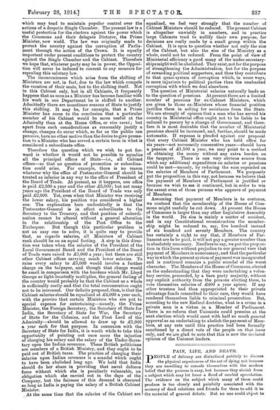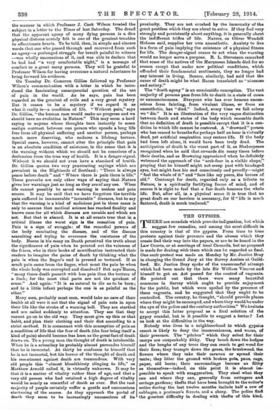PAIN, LIFE, AND DEATH.
PEOPLE of delicacy are disinclined publicly to discuss the physical experiences of theact of dying, not because they are unwilling to console themselves with the modern belief that the process is easy, but because they shrink from a subject which may let loose a flood of morbid speculation. The evidence on the subject which many of them could produce is too closely and painfully associated with the memory of dead relations and friends for them to add it to the material of general debate. But no one could object to
the manner in which Professor J. Cook Wilson treated the subject in a letter to the Times of last Saturday. The dread that the apparent agony of many dying persons is a dire physical distress acutely felt is one of the greatest troubles to affectionate hearts. To be told, then, in simple and sincere words that one who passed through and recovered from such an agony—a prolonged struggle for breath painful to witness —was wholly unconscious of it, and was able to declare that he bad had "a very comfortable night," is a message of comfort to a great many persons. They will be grateful to Professor Wilson for having overcome a natural reluctance to bring forward his evidence.
On Tuesday Dr. Cameron Gillies followed up Professor Wilson's communication with a letter in which be intro- duced the fascinating consequential question of the use of pain in the world. As he says, pain has been regarded as the greatest of evils and a very great mystery But it ceases to be a mystery if we regard it as what it really is—a condition of life, " Without pain," says Dr. Gillies, "the human race would make no progress and we should have no evolution in Nature." This may seem a hard saying to anyone whose thoughts torn instantly to some malign contrast between one person who spends a long life free from all physical suffering and another person, perhaps much more deserving, who endures a lifelong torture. Special cases, however, cannot alter the principle that pain is an absolute condition of existence, in the sense that it is the warning without which we should not be conscious of a declension from the true way of health. It is a danger-signal. Without it we should not even have a standard of health. Dr. Gillies quotes two very penetrating sayings which are prevalent in the Highlands of Scotland: "There is always peace before death " and "Where there is pain there is life." These proverbs are only other ways of *laying that Nature gives her warnings just so long as they are of any use. When life cannot possibly be saved warning is useless and pain ceases. It may be said that we have forgotten the terrible pain suffered in innumerable " incurable " diseases, but to say that the warning is a kind of malicious jest in those cases is only to assume that medical science has reached finality and knows once for all which diseases are curable and which are note But that is absurd. It is at all events true that in a critical illness the worst sign is the cessation of pain. Pain is a sign of struggle: of the remedial powers of the body combating the disease, and of the disease assaulting and trying to overcome the resistance of the body. Bacon in his essay on Death perceived the truth about the significance of pain when he pointed out the vainness of the friars, who in their books of mortification instructed their readers to imagine the pains of death by thinking what the pain is when the finger's end is pressed or tortured. If an much pain came from the finger, what must the pain be when the whole body was corrupted and dissolved? But says-Bacon, "many times death passeth with less pain than the torture of a limb ; for the most vital parts are not the quickest of sense." And again: "It is as natural to die as to be born; and to a little infant perhaps the one is as painful as the other."
Many men, probably moat men, would take no cans of their health at all were it not that the signal of pain cute in upon their life like the stroke of a warning bell. They are startled and are called suddenly to attention. They see that they cannot go on in the old way. They most give up this or that habit, and plan their clothing and their diet according to a strict method, It ie consonant with this conception of pain as a condition of life that the fear of death (the fear being itself a kind of pain) should become less keen as the great fact of death draws on. To a young man the thought of death is intolerable. W ben he is a schoolboy he probably almost persuades himself that he is immortal, At thirty he confesses to himself that he is not immortal, but his horror of the thought of death and his resentment against death are tremendous. With very old people this "almost bloodthirsty clinging to life," as Matthew Arnold called it, is virtually unknown. It may be that it is a matter of vitality rather than of age, and that a very old person who had retained a high degree of vitality would be nearly as resentful of death as ever. But the vast majority of people certainly suffer a gentle and unconscious slackening of the senses. As they approach the portal of death they seem to be increasingly unconscious of its
proximity. They are not crushed by the immensity of the great problem which they are about to solve. If they feel very strongly and persistently about anything, it is generally about the indifferent trifles of life. Nature, as Oliver Wendell Holmes said, supplies her own anaesthetic. Anxiety to live is a form of pain implying the existence of a physical fitness for life. The danger-signal ceases to act, when the warning would no longer serve a purpose. H. L. Stevenson remarked that some of the natives of the Marquesas Islands died for no reason except that under new political conditions, which offended their fundamental sentiments, they no longer had any interest in living. Seneca, similarly, had said that the cause of death might be what Bacon translated as " niceness and satiety."
The "death agony" is an unscientific conception. The vast majority of persons pass from life to death in a state of coins or unconsciousness. Everyone who has ever become uncon- scious from fainting, from virulent illness, or from an anaesthetic, has "died." Indeed, every time we full asleep we "die." It is an illustration of the very vague distinction between death and states of the body which resemble death that no definition of death is possible except that it is a con- dition in which life cannot be restored- A "drowned" person who has ceased to breathe for perhaps half an hour is virtually dead, yet artificial respiration may restore life. If the body had been left alone, it would have been truly dead. The anticipation of death is the worst part of it, as Shakespeare recognized when be said that cowards die many times before their deaths, and as Browning appreciated when be definitely welcomed the approach of the "arch-fear in a visible shape,"` praying that he himself might not creep past with bandaged eyes, but might face his end consciously and proudly—might "feel the whole of it" and "fare like my peers, the heroes of old." Contempt for death, regarded only as a tribute to Nature, is a spiritually fortifying frame of mind, and of course it is right to feel that a fair death honours the whole life. But, after all, in a physical sense it is true that no great draft on our heroism is necessary, for if "life is much flattered, death is much traduced."















































 Previous page
Previous page